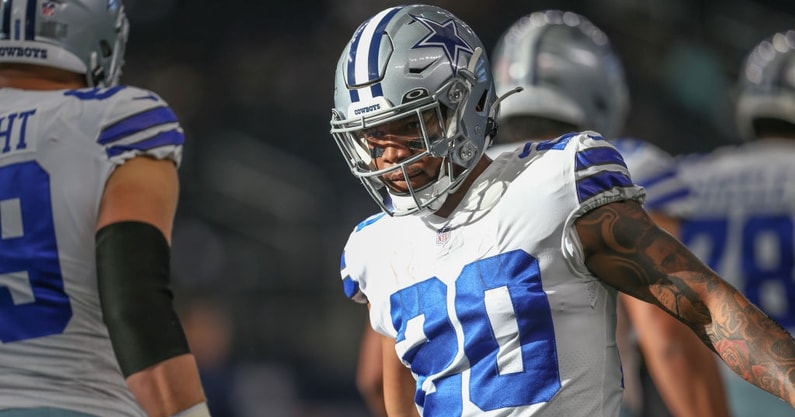WATCH: Cowboys start game with Tony Pollard touchdown run

The Dallas Cowboys started off against the Los Angeles Chargers with a 15-play touchdown drive, ending with running back Tony Pollard picking up the score on a four-yard run. The drive was kept going by a defensive pass interference penalty on a fourth down conversion, allowing the Cowboys to reach the endzone.
Pollard touchdown run gives Cowboys lead
On the 15th play of the Cowboys’ opening drive, Pollard was given the ball on an outside run that let him meet the defense at the goal line before scoring. The touchdown marked the first opening drive touchdown for the Cowboys in their last 20 games.
Although the drive featured heavy use of Ezekiel Elliott, Pollard punched it in for the score. The drive stayed alive on an incomplete pass on fourth-and-one after the Chargers committed a pass interference penalty.
Increased role with offense
Pollard’s use as a secondary option behind Elliott is not new to the Dallas offense, but it is a focus this season according to head coach Mike McCarthy.
Last season with Dallas, Pollard rushed for 101 carries on 4.3 yards per rush and four touchdowns. While the Cowboys offense certainly can use his talent, McCarthy was most excited for his team’s defense seeing it used in practice.
Top 10
- 1Breaking
Sugar Bowl postponed
Orleans Parish DA gives official word
- 2
Georgia sheltering-in-place
Bulldogs monitoring investigation
- 3
'Act of terrorism'
10 killed, 30 injured near Sugar Bowl
- 4Trending
Finebaum surrenders
Waving white flag on Alabama, CFP take
- 5Hot
Bret Bielema
Addressing Shane Beamer taunt
Get the On3 Top 10 to your inbox every morning
By clicking "Subscribe to Newsletter", I agree to On3's Privacy Notice, Terms, and use of my personal information described therein.
“Your two-back schemes the last couple years have increased [in the NFL],” McCarthy said via NFL.com. “You’ll see it the next couple practices. We’re going to see it [on defense] more than we have. Dan [Quinn] needs to see the two-back stuff.”
The benefits of using Pollard more often to start the year means keeping Elliott fresh for a potential playoff run.
“We’ve got some younger guys who can play and produce, so it’s not necessary for Zeke [Ezekiel Elliott] to run the ball 25-30 times a game,” McCarthy explained. “When you get to December, January football, you want him to be in top form to be able to run the ball 25-30 times if needed.”